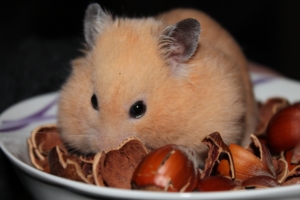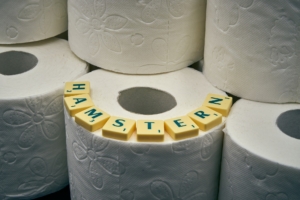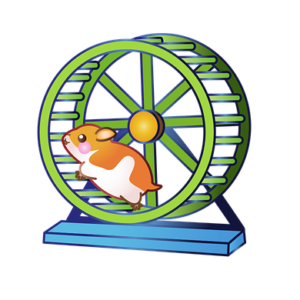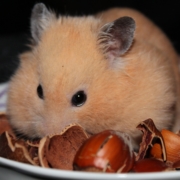Happy hamsters squirrel away supermarket stocks
 Hamsters have been emptying shop shelves across Germany and now seem set to cross borders as other countries take up the telling term Hamsterkauf. Wise advice to stock up on essentials before being confined to home by an anti-coronavirus diktat, combined with an angst attack in the face of a pandemic, has seen runs on toilet paper, pasta, flour and hand gel – snatching away all available wares. The German language term for this buying more than you need is Hamsterkauf, meaning literally hamster buying, or buying like a hamster. The tiny hamster with its puffy cheeks full of nuts is a lovable symbol for sensibly storing what you need for later, like its bigger cousin the squirrel, but neither actually pay for what they accumulate and have never been seen panic buying.
Hamsters have been emptying shop shelves across Germany and now seem set to cross borders as other countries take up the telling term Hamsterkauf. Wise advice to stock up on essentials before being confined to home by an anti-coronavirus diktat, combined with an angst attack in the face of a pandemic, has seen runs on toilet paper, pasta, flour and hand gel – snatching away all available wares. The German language term for this buying more than you need is Hamsterkauf, meaning literally hamster buying, or buying like a hamster. The tiny hamster with its puffy cheeks full of nuts is a lovable symbol for sensibly storing what you need for later, like its bigger cousin the squirrel, but neither actually pay for what they accumulate and have never been seen panic buying.
 Will our terrifying zeitgeist adopt this new word into in English? Piling up stores of stuff can be called stockpiling, storing, hoarding, setting in stores, provisioning, compulsive collecting, shopping addiction, or just plain greed. The English term panic buying, illustrated by empty shop shelves, suggests a senseless stampede, buying as much as possible before it’s all gone because others are also panicking and buying it before it’s all gone, whether or not they need it. By contrast, squirrelling away stuff suggests sensibly saving for a rainy day. Squirrels can hide literally thousands of acorns and nuts for winter fodder, and technical studies have found the squirrel’s brain actually becomes physically larger to store all the location data for its treasures, whereas the panic buyer’s brain appears to shrink down to a reptilian core.
Will our terrifying zeitgeist adopt this new word into in English? Piling up stores of stuff can be called stockpiling, storing, hoarding, setting in stores, provisioning, compulsive collecting, shopping addiction, or just plain greed. The English term panic buying, illustrated by empty shop shelves, suggests a senseless stampede, buying as much as possible before it’s all gone because others are also panicking and buying it before it’s all gone, whether or not they need it. By contrast, squirrelling away stuff suggests sensibly saving for a rainy day. Squirrels can hide literally thousands of acorns and nuts for winter fodder, and technical studies have found the squirrel’s brain actually becomes physically larger to store all the location data for its treasures, whereas the panic buyer’s brain appears to shrink down to a reptilian core.
Interestingly, in the 1960s squirreling was officially encouraged in West Germany as a result of Globalisierungsangst, perhaps translatable as angst about the modern nation’s inability to isolate itself from foreign factors. This expensive year-long “Aktion Eichhörnchen”, which could be translated as Squirrelling Campaign, used leaflets and television advertisements to advise Germans to obtain and store supplies in quantities that would last at least two weeks, but it is estimated that only around three percent of households followed the advice, for reasons described in a fascinating article in German in Spiegel magazine. By contrast, members of the Mormon faith are currently advised to keep at least three months of food and water at home and even a year’s worth if they can.
 Hamsterkauf also enjoys a corresponding German verb, hamstern, which translates as buy like a hamster, and German has various other compound words containing hamster, such as Hamsterware and Hamsterfrau. Some of these are even found in translation in adjoining languages which also see the humble hamster as a shrewd saver. Should we create a new English word hamsterism? Would that describe a way of behaving, an ideology, or a medical condition like lycanthropy? Perhaps soon in English we will be talking of replacing hungry austerity with plump hamsterity, and engaging in hamstering or a hamster fest, which sounds a more pleasant way to pass the time in shops, though it might initially remind us of the hamster on its wheel.
Hamsterkauf also enjoys a corresponding German verb, hamstern, which translates as buy like a hamster, and German has various other compound words containing hamster, such as Hamsterware and Hamsterfrau. Some of these are even found in translation in adjoining languages which also see the humble hamster as a shrewd saver. Should we create a new English word hamsterism? Would that describe a way of behaving, an ideology, or a medical condition like lycanthropy? Perhaps soon in English we will be talking of replacing hungry austerity with plump hamsterity, and engaging in hamstering or a hamster fest, which sounds a more pleasant way to pass the time in shops, though it might initially remind us of the hamster on its wheel.
The hamster wheel is often seen as a symbol of fevered and futile activity, and someone who says they feel like a hamster on a wheel usually means they are running hard and getting nowhere or frustratingly going in circles. The running actually helps the caged hamster keep fit and fight boredom, not unlike the motorised treadmills used by confined humans to keep fit in a world that demands so little physical effort from them, aside from carrying tons of shopping.




